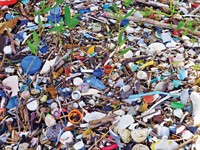Advertisement
Grab your lab coat. Let's get started
Welcome!
Welcome!
Create an account below to get 6 C&EN articles per month, receive newsletters and more - all free.
It seems this is your first time logging in online. Please enter the following information to continue.
As an ACS member you automatically get access to this site. All we need is few more details to create your reading experience.
Not you? Sign in with a different account.
Not you? Sign in with a different account.
ERROR 1
ERROR 1
ERROR 2
ERROR 2
ERROR 2
ERROR 2
ERROR 2
Password and Confirm password must match.
If you have an ACS member number, please enter it here so we can link this account to your membership. (optional)
ERROR 2
ACS values your privacy. By submitting your information, you are gaining access to C&EN and subscribing to our weekly newsletter. We use the information you provide to make your reading experience better, and we will never sell your data to third party members.
Persistent Pollutants
EU firms agree to more plastic recycling
Environmental groups criticize the voluntary agreement for lacking ambition
by Alex Scott
September 25, 2019
| A version of this story appeared in
Volume 97, Issue 38
More than 100 public organizations as well as companies making and recycling plastic in the European Union have agreed to recycle at least 10 million metric tons (t) of plastic annually by 2025. Currently, less than 4 million t of plastic are recycled in the region out of the more than 27 million t of plastic waste generated, according to the European Commission.
Targets
Alliance aims to more than double plastic recycling
▸ 10 million t: Target for annual plastic recycling by 2025.
▸ 4 million t:Current level of plastic recycling.
▸ 27 million t: Amount of plastic waste generated annually in the EU.
▸ 55%: Target for share of plastic packaging to be recycled by 2030.
▸ 5%: Current level of plastic packaging recycling.
The signatories to the declaration, which include firms such as BASF, Covestro, and Unilever, are members of the Circular Plastics Alliance, a partnership between plastics producers, converters, and recyclers the EC set up in December 2018 in response to the growing environmental hazard posed by plastic waste.
The agreement, which is voluntary, includes measures that members will take to meet the target, including the redesign of plastic products to make them easier to recycle, the development of monitoring systems to track the flow of plastic waste, and improvements to waste collection, sorting, and recycling. The pact also includes a commitment to develop new technologies, such as the cracking of plastic waste into raw materials for the chemical industry.
Pulling together players from across the plastic value chain is the only way to transform plastic production from a linear system to a circular one, according to Covestro CEO Markus Steilemann. “Europe can provide impetus here worldwide,” he says in a statement.
Environmental groups, though, say the declaration represents “a missed opportunity” because it lacks ambition and transparency. Plastic production in Europe is set to double by 2035, says the European Environmental Bureau, one of the alliance’s critics, so even if the alliance hits its target the region will still depend highly on virgin plastic. The agreement also ignores risks posed by toxic substances in waste plastic, which could make their way into new products, the bureau says.
Voluntary initiatives to rein in plastic waste are also underway outside Europe. The industry-founded Alliance to End Plastic Waste is partnering with Project STOP, an initiative cofounded by plastic producer Borealis, to improve waste management in Indonesia, the second-largest contributor to ocean plastics after China. The organizations aim to introduce new waste management infrastructure to stop 13,200 t of plastic from entering the Indian Ocean in the Jembrana region of the Indonesian island of Bali.




Join the conversation
Contact the reporter
Submit a Letter to the Editor for publication
Engage with us on Twitter